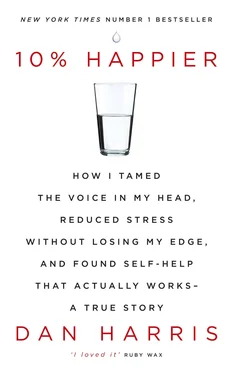Before the main event, the producers asked me to tape preinterviews with the combatants, goading them into talking smack like boxers before they go in the ring. After chatting with the ex-hooker and the two pastors, my crew and I found Deepak in one of the church’s back rooms. In addition to blinged-out glasses, he wore jeans, bright red sneakers, and a blazer the likes of which I had never seen—charcoal gray, knee-length, with an elaborate mandarin collar. He had a fleshy face; pleasant, latte-colored skin; and a soft, chocolate baritone, with just enough of an Indian accent to sound exotic.
In the interview, he exuded bravado, as befitted an event such as this. He dismissed Satan as a construct of people who needed an “irrational, mythical explanation” for evil in the world. As for his debate performance, he vowed, “I am not going to do anything to offend anyone, but I still have to speak my own truth.”
Clearly, Chopra was “with the program,” the one envisioned by Nightline , but he also presented an irresistible opportunity for me to pursue my own agenda. I wanted to get his take on Eckhart Tolle. So I told him my story—that I had been intrigued by Tolle’s description of the ego but bemused by his lack of actionable advice.
Right off the bat, Chopra dismissed Tolle as “not a very good writer.” ( Apparently self-help gurus talk smack about one another, just as some evangelicals do , I realized.) Then, when I asked him if he knew how to stay in the moment, he allowed that he did. In fact, he insisted that he was permanently present.
Our bosses had been encouraging the on-air types to produce more content for ABCNews.com. I thought talking to Deepak about the notion of the Now might make a good little video, so I whipped out a Flip camera and popped a few more questions.
“So your mind doesn’t wander?” I asked. “You don’t find yourself thinking about things that are in the past or in the future?”
“I have no regrets about the past,” he said, “and I don’t anticipate the future. I live in the moment.”
“Okay, so what if the moment is horrible? What if you really have to go to the bathroom and there’s no toilet nearby? Or what if you’re super hungry and there’s no food?”
“Then I separate myself from the situation surrounding the moment. The moment is always free.”
“Run that by me again,” I said. “It’s a sort of mind trick?”
“It’s not a mind trick. When you’re totally present, whatever the situation is, good or bad, it’s gonna pass. The only thing that remains is the moment. It’s the transformational vortex to the infinite.”
Apparently when one lives in the moment, one becomes unafraid of using terms like “transformational vortex to the infinite.”
He still wasn’t giving me specifics, so I pushed again. “How do you do that? Because while I’m talking to you right now, sometimes my mind wanders, and I think, ‘Wow, those are nice glasses,’ or ‘What am I going to ask next?’ ”
“If you stay in the moment, you’ll have what is called spontaneous right action, which is intuitive, which is creative, which is visionary, which eavesdrops on the mind of the universe.”
I had no idea what he was talking about, but we were out of time. The sound tech arrived and began wiring Chopra with his lapel microphone for the debate.
“I still think you make it sound easier than it is,” I said.
He looked at me and gave a good-natured shrug that seemed to say, What can I say, you unlucky schmuck?
“For me it is,” he said.
“How do I become more like you?”
“Hang around with me,” he said. And then, moving in closer as the sound guy struggled to keep up, he asked for my mailing address, which I somewhat reluctantly gave him.
After all that fancy talk of living in the moment and “eavesdropping on the mind of the universe,” as soon we hit the stage and got into the heat of the debate, Chopra was raising his voice, gesticulating wildly, and arguing in a way that certainly did not signal serenity. When he didn’t have the floor, he would slouch back in his chair, feet stretched out in front of him, looking entirely nonplussed. To me, at least, he didn’t seem to be present at all—certainly not in the Eckhart Tolle, blissed-out way. But maybe he was? What did I know? Maybe, I thought to myself, I shouldn’t reach reflexive conclusions as I did with Ted Haggard. Perhaps Deepak Chopra represented the twinning of passionate striving and ego subjugation. Is it possible this guy had it all figured out?
I wasn’t optimistic.
But I was surprised by the reaction when I posted my Chopra video on the ABC News website. First, it generated so much traffic that it landed in the “Most Viewed” column. Then, I got an email from the last person I expected: my boss.
David Westin, the president of the news division, was not the type of man I thought likely to be searching for a transformational vortex to the infinite. Formerly a corporate lawyer, he’d run the news division for more than a decade. He was sharply handsome, with boyish Midwestern features and a full head of slightly blond hair that seemed to stay firmly in place without any discernible application of product. He favored Brooks Brothers suits, striped ties, and loafers, and his personal style was commensurately crisp, earnest, and affable. He easily could have been a politician—or an anchorman.
Westin’s email said he was curious, on a personal level, about my conversation with Chopra. He suggested we meet to discuss.
His assistant set an appointment, and a few days later I found myself walking up one flight of stairs from my office to the executive suite, referred to simply by its geographic designation, the Fifth Floor. The air was different up here, as if it were pumped in from the Sierra Nevada. It was a wide-open room, with offices lining the periphery, and assistants stationed outside of each. The heavy hush was devoid of the clack and clamor that characterized the rest of the news division. In the middle of the space was a kitchen island, perennially stocked with snacks and free-flowing Starbucks.
Westin’s secretary ushered me in, and the man himself got up from his neatly organized desk to give me a firm handshake and a courtly, enthusiastic, “Hi, Dan!”
After a bit of small talk, he brought up Chopra. In his diplomatic way, he said he was surprised to see me taking the guy so seriously. “I respect your opinion on these things, Dan—and Deepak is somebody I’ve only ever seen on daytime television. Is there really something to him?”
As he spoke, I began to suspect that there must be more to my boss’s interest than he was letting on. Here was a man with a supremely stressful job, managing both the outsized personalities within the news division and the demands of his corporate overlords. Once, over lunch, he’d admitted to me that his real personality was at times significantly less sunny than his persona.
“There is something there,” I said, “although I’m not sure Chopra is the best example of it.”
Then I launched into an unsuccessful and overly emphatic soliloquy about Eckhart Tolle, the ego, the present moment, and God knows what else. The longer I yammered on about the “thinking mind” and the “voice in the head,” the more I realized that I wasn’t making much sense. This was the first opportunity I’d had to discuss this material with anyone, aside from actually interviewing Tolle and Chopra themselves, and it suddenly hit me that I didn’t really know what I was talking about. Which made me even more anxious and, by turns, even more talkative. Finally, seeing I’d lost my audience, I swallowed the flood of saliva in my mouth and concluded by saying that maybe Westin should just read Tolle’s book.
Читать дальше












